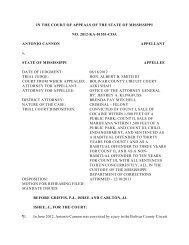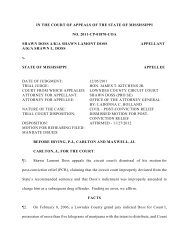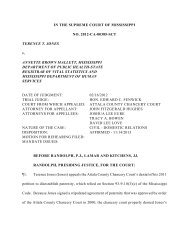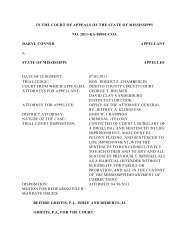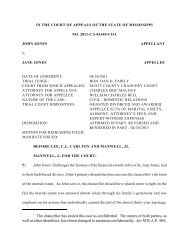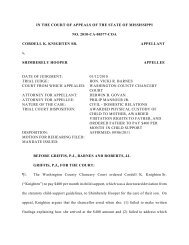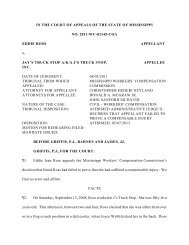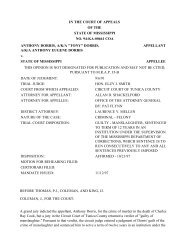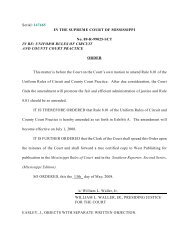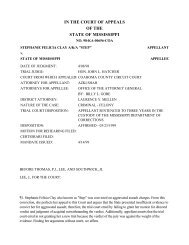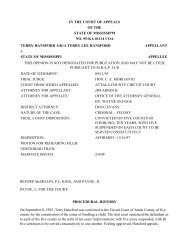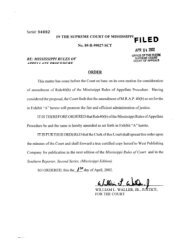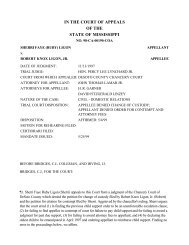IN THE SUPREME COURT OF MISSISSIPPI NO. 2005-DR ... - Justia
IN THE SUPREME COURT OF MISSISSIPPI NO. 2005-DR ... - Justia
IN THE SUPREME COURT OF MISSISSIPPI NO. 2005-DR ... - Justia
You also want an ePaper? Increase the reach of your titles
YUMPU automatically turns print PDFs into web optimized ePapers that Google loves.
THONG LE<br />
v.<br />
STATE <strong>OF</strong> <strong>MISSISSIPPI</strong><br />
<strong>IN</strong> <strong>THE</strong> <strong>SUPREME</strong> <strong>COURT</strong> <strong>OF</strong> <strong>MISSISSIPPI</strong><br />
<strong>NO</strong>. <strong>2005</strong>-<strong>DR</strong>-00523-SCT<br />
DATE <strong>OF</strong> JUDGMENT: 08/23/2002<br />
TRIAL JUDGE: HON. JAMES W. BACKSTROM<br />
<strong>COURT</strong> FROM WHICH APPEALED: JACKSON COUNTY CIRCUIT <strong>COURT</strong><br />
ATTORNEYS FOR APPELLANT: <strong>MISSISSIPPI</strong> <strong>OF</strong>FICE <strong>OF</strong> CAPITAL POST<br />
CONVICTION COUNSEL<br />
BY: ROBERT M. RYAN<br />
LOUWLYNN VANZETTA WILLIAMS<br />
ATTORNEYS FOR APPELLEE: <strong>OF</strong>FICE <strong>OF</strong> <strong>THE</strong> ATTORNEY GENERAL<br />
BY: PAT MCNAMARA<br />
DISTRICT ATTORNEY:<br />
NATURE <strong>OF</strong> <strong>THE</strong> CASE:<br />
MARV<strong>IN</strong> L. WHITE, JR.<br />
KEITH MILLER<br />
CIVIL - DEATH PENALTY - POST<br />
CONVICTION RELIEF<br />
DISPOSITION: DENIED - 08/16/2007<br />
MOTION FOR REHEAR<strong>IN</strong>G FILED:<br />
MANDATE ISSUED:<br />
EN BANC.<br />
DICK<strong>IN</strong>SON, JUSTICE, FOR <strong>THE</strong> <strong>COURT</strong>:<br />
1. Thong Le and Ngan Tran were indicted for capital murder in the beating and<br />
strangulation deaths of Minh Heiu Thi Huynh and her two daughters, Thuy, age eleven, and<br />
Than, age fifteen. Ngan Tran, who was believed to have committed the actual killings, took<br />
his own life while in custody. Le went to trial and was sentenced to death by lethal injection.
FACTS AND PROCEDURAL HISTORY<br />
2. At Le’s trial the State presented evidence which showed that the pair had gone to<br />
Huynh’s home for the purpose of robbing her. The two were admitted into the apartment by<br />
the children, who were home alone. When Huynh returned, she and the children were bound,<br />
savagely beaten and strangled to death. Le and Tran spent hours attempting to sanitize the<br />
scene with water and bleach. The two left with $1,300 cash and a book bag containing some<br />
household items. Following their arrest, Tran hanged himself in his cell. Le went to trial<br />
where he was convicted of capital murder committed during the course of a robbery. He was<br />
sentenced to death by lethal injection. On direct appeal, Le’s conviction and sentence were<br />
affirmed by this Court. Le v. State, 913 So. 2d 913 (Miss. <strong>2005</strong>). Le now files a motion for<br />
post-conviction relief arguing ten issues, which are each discussed below.<br />
ANALYSIS<br />
I. Ineffective Assistance of Counsel.<br />
3. Ineffective assistance of counsel was raised as an issue on direct appeal (Le, 913 So.<br />
2d at 950-55) and should be procedurally barred from consideration on collateral appeal.<br />
Miss. Code Ann. § 99-39-21(Rev. 2000). Le now raises other instances of alleged ineffective<br />
assistance and argues that trial counsel rendered ineffective assistance in failing to pursue a<br />
change of venue, failing to strike a particular juror, and in failing to retain an expert in the<br />
field of false confessions. Despite the procedural bar, this discussion follows:<br />
The benchmark for judging any claim of ineffectiveness [of counsel] must be<br />
whether counsel's conduct so undermined the proper functioning of the<br />
adversarial process that the trial cannot be relied on as having produced a just<br />
result.<br />
2
Strickland v. Washington, 466 U.S. 668, 686 (1984) 104 S.Ct. 2052, 8 L. Ed. 674.<br />
4. One who claims ineffective assistance of counsel must demonstrate that counsel's<br />
performance was deficient and that the deficiency prejudiced the defense of the case. Id. at<br />
687. "Unless a defendant makes both showings, it cannot be said that the conviction or death<br />
sentence resulted from a breakdown in the adversary process that renders the result<br />
unreliable." Stringer v. State, 454 So. 2d 468, 477 (Miss.1984) (citing Strickland, 466 U.S.<br />
at 687).<br />
5. Defense counsel is presumed competent. Washington v. State, 620 So. 2d 966 (Miss.<br />
1993). But even where professional error is shown, the reviewing court must determine<br />
whether there is "a reasonable probability that, but for counsel's unprofessional errors, the<br />
result of the proceeding would have been different." Mohr v. State, 584 So. 2d 426, 430<br />
(Miss. 1991). In death penalty appeals, the most important inquiry is "whether there is a<br />
reasonable probability that, absent the errors, the sentencer--including an appellate court, to<br />
the extent it independently re-weighs the evidence--would have concluded that the balance<br />
of the aggravating and mitigating circumstances did not warrant death." Strickland v.<br />
Washington, 466 U.S. at 695.<br />
6. Le first claims that trial counsel erred in failing to seek a change of venue because of<br />
extensive pre-trial publicity in local newspapers. The fact that at least two jurors had simply<br />
“heard a little bit on the news”seems woefully inadequate when claiming that the jury venire<br />
was not impartial. A review of the transcript of the voir dire process indicates that most of<br />
the venire was largely unaware of this particular case and those members who were unaware<br />
of it assured counsel and the trial court that they could be impartial. This Court has held that<br />
3
defense counsel is under no duty to attempt to transfer venue; therefore, the decision not to<br />
seek a change of venue falls within the realm of trial strategy. Bishop v. State, 882 So. 2d<br />
135, 142 (Miss. 2004). This assertion is without merit.<br />
7. Le next claims that trial counsel’s performance was deficient in failing to strike juror<br />
number eleven from the panel. When asked about prior knowledge of the case, this particular<br />
juror volunteered that shortly after being summoned for jury duty, the name “T. Le” had<br />
appeared on her telephone’s caller ID and that she reported the matter to the District<br />
Attorney’s office. The trial court and counsel examined this juror at the bench and<br />
discovered that she knew little else of the case other than that it had occurred. The juror<br />
assured the trial court that the incident would not influence her decision making if she were<br />
selected to serve on the jury. This assertion is without merit.<br />
8. Finally, Le argues that his confession was “inaccurate, misleading, false in material<br />
particulars, and totally unreliable” such that trial counsel must be faulted for failing to retain<br />
an expert in the field of false confessions. Petitioner further characterizes this omission as<br />
a failure to investigate. Although couched as a claim of ineffective assistance of counsel, this<br />
Court thoroughly considered the matter on direct appeal as part of Le’s challenge regarding<br />
his pretrial motion to suppress the confession. Le, 913 So. 2d at 930-34.<br />
9. There was testimony at the suppression hearing that Le had been given his Miranda<br />
warnings on two separate occasions and that Le was a nineteen-year-old born in this country<br />
whose native language was English. This Court considered the entire record (including the<br />
hearing on the pre-trial motion to suppress) and still found no error in the trial court’s<br />
4
decision to admit the statement. Id. at 934. Petitioner makes no convincing showing that he<br />
was incompetent to give the statement or that he was psychologically coerced to confess.<br />
10. Instead, much of petitioner’s argument on this issue goes to whether Le was the type<br />
of individual to have taken an active role in the commission of the killings. Petitioner<br />
submits the affidavit of a clinical psychologist who opines that Le is not by nature a violent<br />
person. Le’s legal culpability as an accomplice is not reduced by this sort of argument. His<br />
willing participation in the successive killings of three defenseless people makes him every<br />
bit as responsible as the ring leader. It therefore cannot be said that the testimony of an<br />
expert would have changed the outcome at trial. This assertion is without merit.<br />
II. Weight of the Evidence as to Intent and a Disproportionate<br />
Sentence.<br />
11. Le next argues that, given his minimal role in the crime, the jury’s finding concerning<br />
his intent to kill was not supported by the evidence, and the death sentence was<br />
disproportionate. This issue was thoroughly considered on direct appeal and found to be<br />
without merit. Le, 913 So. 2d at 943-47. Specifically, this Court held that the jury had found<br />
more than just contemplation by Le that lethal force would be employed with regard to all<br />
three murders. Id. at 945. The Court found that “Le’s argument that he was guilty of nothing<br />
more than contemplation of lethal force is without merit.” Id. In doing so, this Court noted<br />
Le’s admission that he knew Tran had a gun and that he assisted Tran in binding the victims<br />
and even choked Huynh and helped to sanitize the crime scene. Id. at 946. The Court further<br />
held that imposition of the death penalty under these circumstances was not disproportionate<br />
to those death sentences imposed in other cases. Id. at 947. The issue was found to be<br />
5
wholly without merit and reconsideration on collateral appeal is procedurally barred by<br />
statute. Miss. Code Ann. § 99-39-21(2) and (3)(Rev. 2000).<br />
III. Failure to Suppress Confession as Fundamental Reversible<br />
Error.<br />
12. This is the same argument put forth as an alleged instance of ineffective assistance of<br />
counsel. Le now argues that he was psychologically incompetent to give a reliable statement<br />
to law enforcement authorities and that this condition was not known at the time of trial.<br />
This issue is essentially a restatement of the ineffective assistance claim presented earlier<br />
under the guise of failure to retain a false confession expert. As mentioned previously, the<br />
admissibility of the statement was discussed thoroughly on direct appeal. Le, 913 So. 2d at<br />
930-34. Reconsideration on collateral appeal is now procedurally barred pursuant to Miss.<br />
Code Ann.§ 99-39-21(2) and (3)(Rev. 2000).<br />
IV. Inadmissible Statement of Deceased Co-defendant.<br />
13. This issue was considered in great detail on direct appeal and found to be without<br />
merit. Le, 913 So. 2d at 940-43. Le argued that Tran’s custodial statement to police was<br />
inadmissible hearsay because Tran was no longer available for cross-examination. Le further<br />
argued that the statement fell within no exception to the hearsay rule. This Court found no<br />
constitutional violation because the statement was offered only in rebuttal and was not used<br />
against Le in the State’s case-in-chief. Id. at 942.<br />
14. Le called witnesses in his defense to testify concerning Tran’s statements and thereby<br />
opened the proverbial door to rebuttal testimony. Tran’s statement was not introduced for the<br />
primary purpose of proving Le’s guilt and was therefore not constitutionally impermissible.<br />
6
Having been considered on direct appeal, the issue is now procedurally barred from collateral<br />
review. Miss. Code Ann. § 99-39-21(3)(Rev. 2000).<br />
V. Use of Religious Beliefs to Coerce a Confession.<br />
15. This issue was thoroughly considered by this Court on direct appeal and found to be<br />
without merit. Le, 913 So. 2d at 930-34. The issue centered on a discussion between Le and<br />
Sergeant Joseph Nicholson, who asked Le if he believed that three souls had been taken that<br />
night. Le, however, continued to maintain his innocence. Id. at 931. This Court noted that<br />
Le had already confessed to his participation in the robbery and that the killings had taken<br />
place during the course of the robbery. Id. at 933. Having been considered on direct appeal,<br />
the matter is now procedurally barred from collateral review pursuant to Mississippi Code<br />
Annotated Section 99-39-21(3)(Rev. 2000).<br />
VI. Use of Peremptory Challenges Against African-American<br />
Veniremen.<br />
16. This issue also was thoroughly discussed on direct appeal and found to be without<br />
merit. Le, 913 So. 2d at 925-930. Specifically, the Court held, “we are unable to find the trial<br />
court erred in accepting the race-neutral reasons offered by the State for the strikes of the<br />
seven African-American jurors.” Id. at 930. Having been considered on direct appeal, this<br />
issue is now procedurally barred from collateral review pursuant to Mississippi Code<br />
Annotated Section 99-39-21(3)(Rev. 2000).<br />
VII. Failure to Charge Aggravating Circumstances in the<br />
Indictment.<br />
17. Le argues that his death sentence must be vacated because the aggravating<br />
circumstances which invoked the death penalty were not charged in the indictment. This<br />
7
issue could have been raised on direct appeal and is now procedurally barred from<br />
consideration. Miss. Code Ann. § 99-39-21(Rev. 2000). Despite the procedural bar, the<br />
Court notes the following.<br />
18. Counsel for Le cites (as is done in almost every capital PCR) the rulings of the United<br />
States Supreme Court in Apprendi v. New Jersey, 530 U.S. 466, 120 S. Ct. 2348, 147 L. Ed.<br />
2d 435 (2000) and Ring v. Arizona, 536 U.S. 584, 122 S. Ct. 2428, 153 L. Ed. 2d 556 (2002)<br />
in which that Court held unconstitutional a sentencing scheme where a judge rather than a<br />
jury determined whether there were aggravating circumstances present to warrant imposition<br />
of enhanced punishment.<br />
19. Apprendi was charged with firing shots into the home of an African-American family<br />
in New Jersey. He pled guilty to possession of a firearm for unlawful purposes and, after the<br />
judge accepted the guilty plea, the prosecutor moved for an enhanced sentence on the basis<br />
that it was a hate crime. Apprendi argued that he was entitled to have the finding on<br />
enhancement decided by a jury. The U.S. Supreme Court held, "Other than the fact of a prior<br />
conviction, any fact that increases the penalty for a crime beyond the prescribed statutory<br />
maximum must be submitted to a jury, and proved beyond a reasonable doubt." Apprendi,<br />
530 U.S. at 490.<br />
20. In 2002, the U.S. Supreme Court decided Ring v. Arizona. 536 U.S. 584 Ring<br />
addressed the issue of whether the Arizona capital sentencing process as upheld in Walton<br />
v. Arizona, 497 U.S. 639 (1990) with a jury deciding guilt and a judge making findings on<br />
aggravating factors, could survive the Apprendi decision. The Supreme Court decided it<br />
could not. Id.<br />
8
[W]e overrule Walton to the extent that it allows a sentencing judge, sitting<br />
without a jury, to find an aggravating circumstance necessary for imposition<br />
of the death penalty. See 497 U.S., at 647-649, 110 S.Ct. 3047. Because<br />
Arizona's enumerated aggravating factors operate as "the functional equivalent<br />
of an element of a greater offense," Apprendi, 530 U.S., at 494, n. 19, 120<br />
S.Ct. 2348, the Sixth Amendment requires that they be found by a jury.<br />
Ring, 536 U.S. at 609. The Court specifically noted, "Ring's claim is tightly delineated: He<br />
contends only that the Sixth Amendment required jury findings on the aggravating<br />
circumstances asserted against him." Id. at 597, n.4. Ring did not contend that his<br />
indictment was constitutionally defective as does Le.<br />
21. As a practical matter, Rule 7.06 of the Uniform Circuit and County Court Rules<br />
provides that an indictment shall be “a plain, concise and definite written statement of the<br />
essential facts constituting the offense charged and shall fully notify the defendant of the<br />
nature and cause of the accusation.” A defendant is not entitled to formal notice of the<br />
aggravating circumstances to be employed by the prosecution. An indictment for capital<br />
murder puts a defendant on sufficient notice that the statutory aggravating factors will be<br />
used against him. Smith v. State, 729 So. 2d 1191, 1224 (Miss. 1998) (relying on Williams<br />
v. State, 445 So. 2d 798 (Miss. 1984)).<br />
We believe that the fact that our capital murder statute lists and defines<br />
to some degree the possible aggravating circumstances surely refutes the<br />
appellant's contention that he had inadequate notice. Anytime an individual<br />
is charged with murder, he is put on notice that the death penalty may result.<br />
And, our death penalty statute clearly states the only aggravating<br />
circumstances which may be relied upon by the prosecution in seeking the<br />
ultimate punishment.<br />
Williams, 445 So. 2d at 804-05. This Court has consistently found this issue (failure to<br />
charge the aggravating factors in the indictment) to be without merit. Havard v. State, 928<br />
9
So. 2d 771(Miss. 2006); Berry v. State, 882 So. 2d 157, 172 (Miss. 2004). As raised by Le,<br />
the issue continues to be without merit.<br />
VIII. Lethal Injection Violates the Eighth Amendment.<br />
22. This issue was capable of being raised on direct appeal and is procedurally barred<br />
from further consideration on collateral appeal. Miss. Code Ann. § 99-39-21(1)(Rev. 2000).<br />
In Jordan v. State, the petitioner failed to raise lethal injection as an Eighth Amendment<br />
claim and this Court employed the procedural bar.<br />
Jordan failed to make any claim relating to the method of execution at trial or<br />
on direct appeal. Therefore, this claim is barred for consideration for the first<br />
time on application for leave to seek post-conviction relief. See Miss. Code<br />
Ann. § 99-39-21(1); Bishop v. State, 882 So. 2d 135, 149 (Miss. 2004);<br />
Grayson v. State, 879 So. 2d 1008, 1020 (Miss. 2004).<br />
918 So. 2d 636, 661. Despite the procedural bar, this Court looked to merits of the claim and<br />
found none based on Jordan’s failure to submit any sworn proof as required by Mississippi<br />
Code Annotated Section 99-39-9(1)(e)(Rev. 2000). Id. at 662. Likewise, counsel for Le<br />
fails to submit any affidavit which legitimately questions the lethal injection protocol<br />
employed by the Mississippi Department of Corrections. This issue is without merit.<br />
IX. Cumulative Error.<br />
23. Le argues generally that the alleged preceding errors, taken as a whole, deprived him<br />
of a fair trial. The standard of review for an appeal from a capital murder conviction and<br />
death sentence is that it must be subjected to "heightened scrutiny." Balfour v. State, 598<br />
So. 2d 731, 739 (Miss. 1992) (citing Smith v. State, 499 So. 2d 750, 756 (Miss. 1986); West<br />
v. State, 485 So. 2d 681, 685 (Miss. 1985)). All doubts are to be resolved in favor of the<br />
accused because "what may be harmless error in a case with less at stake becomes reversible<br />
10
error when the penalty is death." Id. (quoting Irving v. State, 361 So. 2d 1360, 1363 (Miss.<br />
1978)). See also Fisher v. State, 481 So. 2d 203, 211 (Miss. 1985).<br />
24. With regard to the issue of alleged cumulative error, the Court previously has taken<br />
note of those capital cases in which the opinions of this Court articulated differing analyses.<br />
For example, in McFee v. State, 511 So. 2d 130, 136 (Miss. 1987) (rape conviction and life<br />
sentence affirmed), this Court individually addressed each assignment of error and found<br />
none (harmless or otherwise) by the trial court. Based on that finding, the Court stated:<br />
In sum, McFee contends that the cumulative effect of the alleged errors was<br />
sufficient to prejudice the jury, essentially allowing the State to convict him<br />
not of rape, but of murder. Yet, as discussed, neither the introduction of the<br />
photographs nor the prosecutor's comments constituted reversible error. As<br />
there was no reversible error in any part, so there is no reversible error to the<br />
whole.<br />
Id. However, in Jenkins v. State, 607 So. 2d 1171, 1183-84 (Miss. 1992) (capital murder<br />
conviction and death sentence reversed and remanded), in which this Court found both<br />
harmless error and reversible error by the trial court, the Court stated:<br />
If reversal were not mandated by the State's discovery violations, we would<br />
reverse this matter based upon the accumulated errors of the prosecution.<br />
This Court has often ruled that errors in the lower court that do not require<br />
reversal standing alone may nonetheless taken cumulatively require reversal.<br />
Id. (citing Griffin v. State, 557 So. 2d 542, 552-53 (Miss. 1990)). In Manning v. State, 726<br />
So. 2d 1152, 1198 (Miss. 1998), overruled on other grounds by Weatherspoon v. State; 732<br />
So. 2d 158 (Miss. 1999) (capital murder convictions and death sentence affirmed), after<br />
addressing twenty-one assignments of error with sub-parts, and after making numerous<br />
findings of no "reversible error," the Court stated:<br />
11
This Court has held that individual errors, not reversible in themselves, may<br />
combine with other errors to make up reversible error. Hansen v. State, 592<br />
So. 2d 114, 142 (Miss. 1991); Griffin v. State, 557 So. 2d 542, 553 (Miss.<br />
1990). The question under these and other cases is whether the cumulative<br />
effect of all errors committed during the trial deprived the defendant of a<br />
fundamentally fair and impartial trial. Where there is "no reversible error in<br />
any part, . . . there is no reversible error to the whole." McFee v. State, 511<br />
So. 2d 130, 136 (Miss. 1987).<br />
Manning, 726 So. 2d at 1198.<br />
25. To reconcile these different views, the Byrom court held:<br />
What we wish to clarify here today is that upon appellate review of cases in<br />
which we find harmless error or any error which is not specifically found to be<br />
reversible in and of itself, we shall have the discretion to determine, on a caseby-case<br />
basis, as to whether such error or errors, although not reversible when<br />
standing alone, may when considered cumulatively require reversal because<br />
of the resulting cumulative prejudicial effect. That having been said, for the<br />
reasons herein stated, we find that errors as may appear in the record before us<br />
in today's case, are individually harmless beyond a reasonable doubt, and when<br />
taken cumulatively, the effect of all errors committed during the trial did not<br />
deprive Michelle Byrom of a fundamentally fair and impartial trial. We thus<br />
affirm Byrom's conviction and sentence.<br />
Byrom, 863 So. 2d at 846-47. In the present case, the record supports no finding of error,<br />
harmless or otherwise, upon the part of the trial court or on the part of trial counsel.<br />
Consequently, there can be no prejudicial cumulative effect and no adverse impact upon Le’s<br />
constitutional right to fair trial.<br />
X. Double Prejudice Through Consideration of the<br />
Armed Robbery Charge as well as Reference to<br />
Pecuniary Gain.<br />
26. The same issue was presented to this Court in Brawner v. State and found to be<br />
without merit. Brawner, 947 So. 2d 254 (Miss. 2006). The Court there held:<br />
We have consistently upheld the use of the underlying felony as an<br />
aggravating factor during sentencing. Goodin v. State, 787 So. 2d 639, 654<br />
12
(Miss. 2001) (citing Walker v. State, 671 So. 2d 581, 612 (Miss. 1995)). The<br />
argument is the familiar "stacking" argument. It contends that it is<br />
unconstitutional for the State to elevate murder to capital murder and then,<br />
using the same factor, elevate the sentence to death. As pointed out in Lockett<br />
v. State, 517 So. 2d 1317, 1337 (Miss. 1987), this Court has consistently<br />
rejected this argument. Goodin, 787 So. 2d at 654; Davis v. State, 684 So. 2d<br />
643, 664 (Miss. 1996). However, this Court has found impermissible doubling<br />
where the trial court in a sentencing proceeding submits as separate<br />
aggravating factors both the fact that the capital murder was committed during<br />
the commission of a robbery and for pecuniary gain. Goodin, 787 So. 2d at<br />
654. In that case the two aggravating factors essentially comprise one<br />
circumstance. Id. (citing Willie v. State, 585 So. 2d 660 (Miss. 1991)).<br />
The Florida cases cited by Brawner do not stand for the proposition he<br />
asserts. Rather, they stand for the proposition that the use of two aggravating<br />
factors which essentially comprise one circumstance results in impermissible<br />
doubling. Barnhill, 834 So. 2d at 851; Griffin, 820 So. 2d at 914-15;<br />
Robertson, 611 So. 2d at 1233. This is identical to our law as announced in<br />
Goodin and Willie. Therefore, this assertion is without merit.<br />
Brawner, 947 So. 2d at 265. The same argument is put forth by Le and must fail for the<br />
same reasons. The issue is without merit.<br />
27. LEAVE TO SEEK POST-CONVICTION RELIEF, DENIED.<br />
WALLER, P.J., EASLEY, CARLSON, GRAVES, RANDOLPH AND LAMAR,<br />
JJ., CONCUR. SMITH, C.J., AND DIAZ, P.J., <strong>NO</strong>T PARTICIPAT<strong>IN</strong>G.<br />
13



